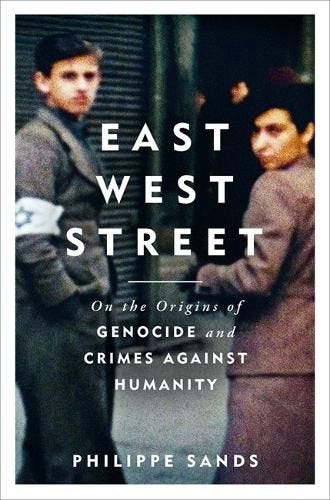East West Street by Philippe Sands
I have a confession to make.
Having lived most of my life in stable democracies, the concepts of international law, crimes against humanity, and genocide often felt distant to me - not particularly relevant to my safe and comfortable everyday existence.
It was when these terms appeared much more frequently in conversation following the Russian invasion of Ukraine, and the attack on Israel by Hamas with the subsequent IDF response, that I realised how little I knew of them. This led me to the incredibly moving East West Street by Philippe Sands.
In this book we witness the birth of the legal concepts of Crimes against Humanity and Genocide through three parallel family histories woven together during the horrors of the Holocaust and Nazi occupation of Poland, Austria, and Ukraine.
The book’s two main characters each develop and champion one of these concepts, campaigning tirelessly for their inclusion in the Nuremberg trials, where senior Nazis faced justice. I was gripped by this narrative which filled the dry subject of the law with the personalities, motivations and histories of the fascinating people involved, all meticulously researched by Sands.
And through his narration, the author gives a deeply compassionate and sensitive account of the Holocaust, including the systematic use, by the Nazis, of national law to put in place, bit by bit, the conditions for mass murder of Jews and other minority and vulnerable groups.
I didn’t realise this: It was actually legal under Nazi law at the time.
And until 1945 there was nothing higher than national law - there was no legal mechanism to say that this extermination of millions was wrong, or to hold anyone to account for these acts.
This is why the Nuremberg trials were so important - they established the process of International Law, which sits above national law. And the crimes of Genocide and Crimes against Humanity - protections for groups and individuals respectively.
While it might seem distant from everyday life, this book has convinced me that international law, however slow and imperfect, is a hugely important and under-appreciated structure in today's world, often overshadowed by the headlines of geopolitical posturing and deal-making.
And beyond its legal role, the workings of international law create a forum and framework in which some of the most horrific events in recent history can be recorded, recognised and acknowledged - an important part of commemorating, grieving and living with terrible things that have happened - things which can never be undone or put right.
Thank you Philippe Sands for sharing your story, and for bringing home to me how hard-fought and hard-won our international legal structure is. It is something to cherish, even with all its current flaws. And something to keep building upon for the benefit of future generations.




